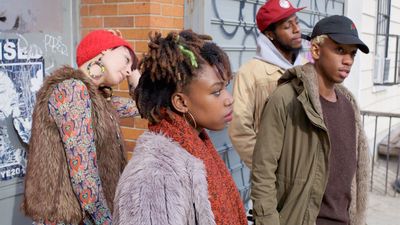Meet Cosmic Homies O.N.E., the New Wave of Kenyan Hip-Hop
The four member music & art collective Cosmic Homies O.N.E. are the sound of #NuNairobi.
Cosmic Homies O.N.E. are the sound of #NuNairobi.
The four member music & art collective first met and formed in Kenya with the aim of challenging traditional and current stereotypes through their self-described “electro-organic” sound.
They’ve had major success in the past as two of its members—rapper/singer/DJ/producer TAIO and singer/producer Runkah—were both in Camp Mulla, a hugely popular Kenyan group that wrote the type of mainstream earworms that play on Top 40 radio.
TAIO and Runkah don’t speak too fondly of their major label days, though, citing that experience as what pushed them towards the underground and a more “organic” approach.
The two formed Cosmic Homies with Los Angeles-born singer/songwriter Marushka and rapper/poet/model Kiwango.
Alongside groups like East African Wave, Cosmic Homies O.N.E are pushing the sound of hip-hop in Nairobi towards a hazy and smoke-filled world.
The group just released their debut mixtape O.N.E. at Nairobi's The Alchemist bar during the "EA Wave & Friends" night, a show they played with Just A Band's Blinky Bill and the East African Wave collective.
We caught up with them during an earlier visit to NYC to get a handle on what the #NuNairobi movement is all about.
Who is Cosmic Homies O.N.E.?
Marushka: Cosmic Homies is a movement. It’s more than just the four of us. It’s an ethos about a new emerging and shifting paradigm. We’re a company. Label. Musicians. Creators. But, first of all, we’re a family.
Why "O.N.E."?
M: Only Now Everlasting. That happened sort of naturally, I was reading an article about graffiti writers, taggers always add “ONE” after their name.
How did you guys get together?
M: Fate, alignment and the perfect situation. We ended up meeting in TAIO’s studio after he broke away from his previous project. [TAIO] built his own independent studio at home where he hosts sessions.
We’re also journalists, actually. Our media partner is What’s Good Live, one of the leading independent platforms in East Africa. TAIO and I were working there together, writing and hosting shows about pan-African content.
When Talib Kweli came over, we talked to him for What’s Good Live. Same with Yasiin Bey.
How do you define #NuNairobi?
M: #NuNairobi is this sense of family and creative energy, made up of creative people, a lot of whom make music in their bedrooms. There’s so much talent in Nairobi and, thanks to platforms like Thrift Social and Creatives Garage, it’s coming together. It’s about more than art, it’s people digging deeper in life.
The thing to point out and say about Nairobi is there hasn’t been support or structures from the government, so we’re doing it ourselves. We're taking matters into our own hands.
What inspired the Cosmic Homies project?
M: People like Dan Eldon—a photojournalist who was stoned to death in Somalia—are a big inspiration. They found 17 bound journals that had all these different collage films and his family composed a book that became a huge influence on the whole of multimedia journalism. It’s called The Journey Is The Destination.
Dan was always my hero, then I found out he’s Karun's [Runkah] uncle!
There’s a new wave of sounds coming out of East Africa and Kenya, would you say you guys are challenging traditional models and sounds?
M: I’d say the trend in East Africa is once you get on the major platforms you sort of get scouted by major labels like Universal or Sony. So I would say in Nairobi, currently, I see a lot of young artists trying to form their own labels. From that you find that people aren’t falling for the same major label tricks.
People are vibing a lot more and finding that they’re in the position where they can bargain and work better and not fall for the traditional models that other artists have done.
Everyone’s thinking: we can do this on our own and take that to the world—whether they accept us or not that’s what it is.
Soundcloud has played a big part in it, actually, we were all on Soundcloud early on. It's really encouraged the community to grow.
Runkah: We actually had a big following [Runkah and TAIO as Camp Mulla] and people called us celebrities. But we wanted to start talking about things that were of our own to people. People now, in Nairobi, are less afraid to be themselves and be about themselves.
We were approached by these major labels at first, but we took a step back. Sonically, people are challenging what’s the norm and what it means to be "successful" and giving themselves the freedom of exploring different styles.
TAIO: I can admit that, before, we were following a formula, but now we're looking to completely redefine pop culture. In East Africa people don’t give a fuck. I can put this electric guitar with a flute and rap over it—it’s awesome to be a part of a scene like that.
What other acts would you name as contemporaries?
T: Ukweli, Jinku, EA Wave, they’re all homies.
We represent #NuNairobi, this new movement which we think was missing in the Kenyan industry before. We believe in the saying “the light that shines on me, shines on my neighbor.” It helps us reach more people a lot faster because we’re pooling resources with our friends.
The very first Cosmic Homies show wouldn’t have happened at all without EA Wave, Jojo Abot performed, Ukweli was there too. Just A Band are like our older brothers too. Big love from day one.
